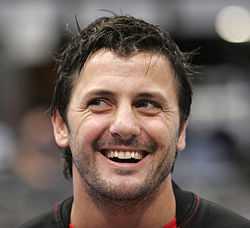Swedish Serbs
| ||||
| Total population | ||||
|---|---|---|---|---|
| ~80-120,000 (estimate) | ||||
| Regions with significant populations | ||||
| Stockholm, Göteborg, Malmö | ||||
| Languages | ||||
| Serbian, Swedish | ||||
| Religion | ||||
| Serbian Orthodox Church | ||||
| Related ethnic groups | ||||
| South Slavs | ||||
Serbs (Swedish: Serber) began migrating to Sweden in large numbers in the 1960s, as part of the migrant work-agreement signed with the Yugoslav government to help Sweden overcome its severe labour shortage. The Yugoslav wars saw another influx of Serbs.
History
Serbs constituted a low percentage of the Swedish population prior to the 1960s. Some came after World War II, mostly seeking political asylum. The greatest proportion of Serbs came together with Greeks, Italians and Turks under the visa agreements in times of severe labour shortages or when particular skills were deficient within Sweden, as migrant workers (called Arbetskraftsinvandring, see gastarbeiter).[1] During the 1960s and 1970s, agreements were signed with the government of Yugoslavia to help Sweden overcome its severe labour shortage.[2]
Bosnian and Croatian Serbs migrated in another wave during and after the Yugoslav wars. Another wave of Kosovar Serbs came during the Kosovo war in 1999.
Demographics
The Swedish census data includes country of birth, but does not include ethnicity, descendants or naturalized people, thus, the total number of ethnic Serbs in Sweden is hard to define. Various estimations include 80,000[3] to 140,000.[4] Aco Dragićević, writing for the Swedish-Serbian newspaper dijaspora, wrote in 2002 that some 200,000 Yugoslavs, regardless of ethnic origin, migrated to Sweden during the Second Yugoslavia (1945-1992); of these, roughly 40% (ca. 80,000) he believed to be Serbs.[5]
Culture
Language
The Serbs in Sweden are bilingual. The Serbian language is a rich contributor to the so-called Rinkeby Swedish, a sociolect (slang) of the Swedish language.
Religion

In 1972 the first Serbian Orthodox parish (of St. Nicholas) was formed in Västerås, prior to the forming the Serbs were headed by Swedish Orthodox priest Christofer Klasson, previously priest in the Church of Sweden. Later, the same year a parish was formed in Malmö (of Saints Cyrils and Methodius) and in 1973 one in Stockholm (of Saint Sava). Later, parishes have been formed in Göteborg (of Stefan Decanski), Jönköping (of Nativity of Mary), Helsingborg (of St Basil the Great) and one more in Stockholm. The parishes have their own head-priest.
In Malmö, 1982, the Church of Saint Cyril and Methodius was opened, the first Serbian church in Sweden. The parish of Saint Sava opened its church in Enskede, in 1983, the parish in Göteborg also has a church.
The parish in Malmö suffered several attacks in 1990, the premises were firebombed but the church was not damaged, the perpetrators were racist youths who were later convicted of arson.[6]
The SOC has parishes and churches in the cities of:
- Stockholm (2)
- Church of Saint Sava
- Eskilstuna
- Västerås
- Göteborg
- Holy Stefan Decanski church
- Jönköping
- Kristianstad
- Helsingborg
- Holy Basil the Great church
- Malmö
- Church of Saints Cyril and Methodius
- Laholm
- Smedjeryd monastery[7]
Music
Stockholm-based Östblocket and Macedonian-Swedish Andra Generationen are both Balkan Brass Bands, playing a musical style from southern Serbia.
Sport
Swedish Serbs have been very successful in sports, among most notable are
The Stockholm Eagles is a Serbian-Swedish basketball team that has become very successful since its establishment in 2007. They won the Swedish second league (Basketettan) back to back 2011 and 2012 and became the only team in Sweden to win 34 victories in a row.[8]
Notable people
| Part of a series of articles on |
| Serbs |
|---|
 |
|
Autochthonous communities
|
|
|
|
Related people |
- Sportspeople
- Dalibor Doder, handball player
- Bojan Djordjic, footballer (AIK, champion 09')
- Dušan Ðurić, footballer (FC Zürich, champion 09')
- Zoran Lukić, football manager (Djurgårdens IF, champions 02' and 03')
- Daniel Majstorović, footballer (FC Basel, champion 08')
- Marko Mitrović, footballer
- Nebojša Novaković, former footballer-assistant manager (AIK, champion 98')
- Peter Popovic, ice hockey player (NHL; Canadiens, Rangers, Penguins and Bruins)
- Rade Prica, footballer (Danish Superliga Top scorer: 06–07', Norwegian Premier League Top scorer: 09')
- Danijela Rundqvist, female ice hockey player (Olympic Silver 2006, Bronze 2002)
- Stefan Selakovic, footballer (IFK Göteborg, champion 07')
- Dragan Umicevic, ice hockey player (NHL; Oilers)
- Ljubomir Vranjes, handball player (Gold; EC 1998, WC 1999, EC 2000, EC 2002, Silver; WC 1997, 2000 Olympics, WC 2001)
- TV and Music
- Aleks, hip-hop, R&B singer
- Alina Devecerski, singer
- Oscar Dronjak, guitarist of power-metal band HammerFall
- Lilleman, rapper
- Jelena Mila, actress
- Dragomir Mrsić, actor (2009 Snabba Cash)
- Jovan Radomir, television personality
- Nikola Šarčević, punk rock musician
- Sven Stojanović, television director (Eurovision Song Contest 2000,2003,2004,2005,2008)
- Other
- Biljana Srbljanović, Swedish-born Serbian playwright and politician
- Dragan Joksović, crime boss
- Ratko Đokić, crime boss
- Milan Ševo, crime boss
See also
References
- ↑ (Swedish) Serbia Government Offices of Sweden.
- ↑ (Swedish) "Historik" (History), Swedish Migration Board.
- ↑
- ↑ http://www.blic.rs/Vesti/Reportaza/291496/Orlovi-vladaju-Svedskom
- ↑ http://www.krstarica.com/lat/dijaspora/index.php?clanak=iseljenici
- ↑ Sydsvenska Dagbladet 13/5, 8/6, 21/9, 31/10 and 1/11, 1990
- ↑ http://mobil.svt.se/2.60664/1.1242819/serbisk-ortodox_kyrka_byggs_i_laholm&lid=aldreNyheter_800565&lpos=rubrik_1242819
- ↑ Stockholm White Eagles
External links
- Association of Serbs in Sweden (Serbian) (Swedish)
- Diaspora, Swedish-Serb organisation
| |||||||||||||||||||
| |||||||||||||||||||



